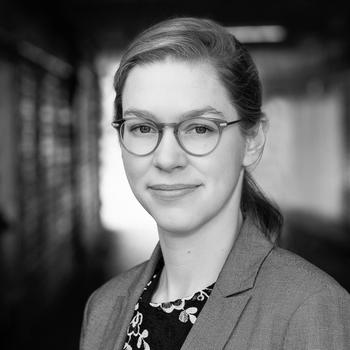Friederike Allner
Critique of Abstraction – Ways of Concretion. Elements of concrete normativity in Hegel, Gadamer and Derrida
The project examines theories of the binding and effective force of norms – normativity – in Hegel, Gadamer and Derrida. It takes up a basic thesis of the Research Training Group, according to which the commitment to a norm is not an automatism, but consists in a complex process that always includes the possibility of criticism and change.
Normativity is explained in the project with the help of the Hegelian concepts of abstraction and concretion. The main systematic thesis states that in order to understand the obligation of norms correctly, normativity must be understood concretely rather than abstractly. In an abstract understanding of normativity, the norm and its application are separate. Normativity understood in abstract terms thus fails to achieve what it is supposed to achieve. Successful normativity, on the other hand, requires a concrete understanding of normativity. In this, norm and object are understood as co-constitutive. In order to develop the main thesis from the interaction with other projects, problem descriptions and proposed solutions from Hegelian philosophy and hermeneutic and deconstructive (legal) philosophy as well as from more recent debates on legal theory will be offered. It will be shown that a concrete understanding of normativity includes four elements: Firstly, normative action is to be understood as action under conditions of uncertainty; secondly, it consists in a practice of distancing participation; thirdly, it requires an ability to deal with non-reproducible practical situations; fourthly, it is determined by an irreducible tension between norm and object.
Research Interests
-
Historic: Rationalism, esp. Leibniz and Spinoza; German Idealism, esp. Hegel; German and French 20th Century Philosophy, esp. Heidegger, Gadamer, Adorno, Derrida.
-
Systematic: Metaphysics, social philosophy, philosophy of right, aesthetics, hermeneutics, (post-)structuralism.
Aufsätze, Übersetzungen, Rezensionen
„Hegels freie Wirklichkeiten. Über Notwendigkeit in Natur und Geist“. Revista Eletrônica Estudos Hegelianos, 21 (38) 2024: S. 165-182. [https://doi.org/10.70244/reh.v21i38.536]
Übersetzung von Michal Beth Dinkler: “Fractals, Layers, Shifts, and Mirrors: Literary Paradigms and New Testament Narratives”. Dt. „Gegen den so genannten ‚literarischen Paradigmenwechsel‘ der neutestamentlichen Forschung – für eine literarische Revolution“, in: Literatur und Religion. Paradigmen der Forschung. Hg. Andreas Mauz and Daniel Weidner, J.B. Metzler Berlin, Heidelberg, 2023, 33-60.
Rezension von: Han Wang, Kognition, Praxis und Aktivität. Die logische Isomorphie des Denkens und des Wirklichen in Hegels „Begriffslogik“, in: Hegel-Studien, Band 56, hrsg. v. Brady Bowman und Birgit Sandkaulen, Hamburg: Meiner 2022, S. 214-218.
Rezension von: Jakub Mácha, Alexander Berg, Hgg.: Wittgenstein und Hegel: Reevaluation of Difference, in: Hegel-Studien, Band 55, hrsg. v. Michael Quante und Birgit Sandkaulen, Hamburg: Meiner 2021, S. 260-263.
Übersetzung von „Digital Art“ von Dominic McIver Lopes: „Digitale Kunst“ in Bertram, Deines, Feige (Hg.): Die Kunst und die Künste. Ein Kompendium zur Kunsttheorie der Gegenwart. Berlin: Suhrkamp 2021 (stw).
„Im Zentrum des Denkens“, Hermeneutische Blätter, Universität Zürich, Institut für Hermeneutik [Rezension Anton Friedrich Koch: Hermeneutischer Realismus], Mai 2019.
„Vielfalt statt Einfalt! Ein Plädoyer“, Hermeneutische Blätter, Universität Zürich, Institut für Hermeneutik, [Rezension Bauer: Mehrdeutigkeit], Februar 2020.
„Die frühere literarische Rezeption von Nietzsches Zarathustra in China“, Literaturstraße, Bd. 18,1, Königshausen und Neumann: 2017.
Vorträge
12/2023. “Entwicklung oder Entfaltung. Über die Notwendigkeit von Sprüngen im Geist”, Vortrag im Workshop “Crises in Nature. Philosophy of Nature and Philosophy of Spirit”, Universität Basel.
09/2023. “Contingency in Actuality: A Normative Interpretation of Hegel's Theory of Modality”, Vortrag im German Idealism Workshop, Claremont McKenna College, Kalifornien.
10/2022. “Contingency in Actuality. A normative interpretation of Hegel’s Concept of Absolute Necessity”, Vortrag im Institutskolloquium, Department for Philosophy, Penn State University, Pennsylvania.





